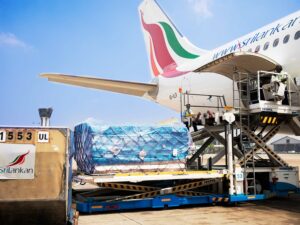Apr 01, 2024

e-commerce has been on a growth trajectory in the last five years, accelerating at a tremendous pace when online retail shopping became the norm during the Covid pandemic. As Asia has the largest share of the global e-commerce market, set to expand by 61 percent by 2025, the demand for the air cargo industry is inevitable.
“e-commerce was already on the rise even before the pandemic started, but it was confined to specific market segments, regions and commodities,” Chaminda Perera, Head of Cargo at SriLankan Airlines, said. “It was on an exponential growth path when the pandemic restrictions were enforced, and it has shown a clear uptick since then.
“It is interesting to examine if there is any cannibalisation from the wholesale market that was transported in larger volumes. Despite that thought, there is no doubt e-commerce has grown phenomenally, which is evident when some e-commerce giants have invested in their own aircraft capacity.
READ: Singapore secures top spot in global connectivity rankings
Asia leads the way
There are many e-commerce platforms which are delivering in Asia, be that Alibaba or Temu, producing sizeable volumes and seeking cost-effective logistics schemes to deliver goods swiftly to their customers.
Asia remains the largest supplier of online commodities to the global demand and, within that, China continues to be a powerhouse in this supply chain despite facing challenges such as slowdowns due to stringent health and safety restrictions.
However, geopolitical issues have prompted buyers and vendors to diversify their operations.
“China +1 policy has spread the production market within the Asia region,” Perera explained. “Countries such as Vietnam, Cambodia, Myanmar and India have emerged as leading countries that supply products, boosting the Asia-Pacific’s standing in this sector.”
READ: Asia Pacific export tonnages and rates continue to rise
Seasonal shifts
e-commerce is particularly susceptible to seasonality, as peak purchasing trends are based on seasonal factors, events, and promotions. Holidays, such as Christmas, Black Friday, Valentine’s Day, Chinese New Year, Mother’s Day, Father’s Day, etc all put pressure on the logistics sector as volumes spike.
Digitalisation of documentation, including airway bills, will support these peaks and troughs by enhanced efficiency across the e-commerce sector and ensuring greater preparation.
“Whoever is geared to handle e-commerce traffic with the technological advancements will be able to reap the harvest,” Perera stated. “e-commerce movements including returns that accounts for a return rate of 15 – 20 percent will boost the loads of airfreight.”
The post Sri Lanka embraces e-commerce appeared first on AIR CARGO WEEK.
Go to Source
Author: Edward Hardy
Latest Posts





